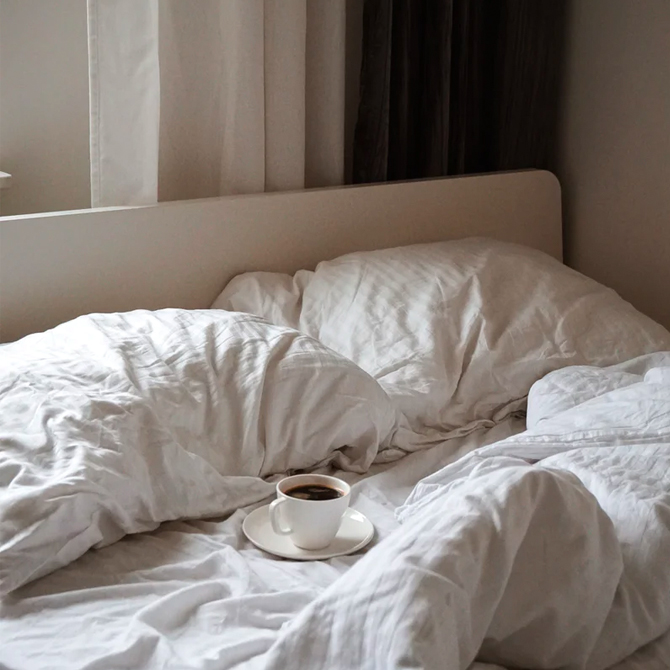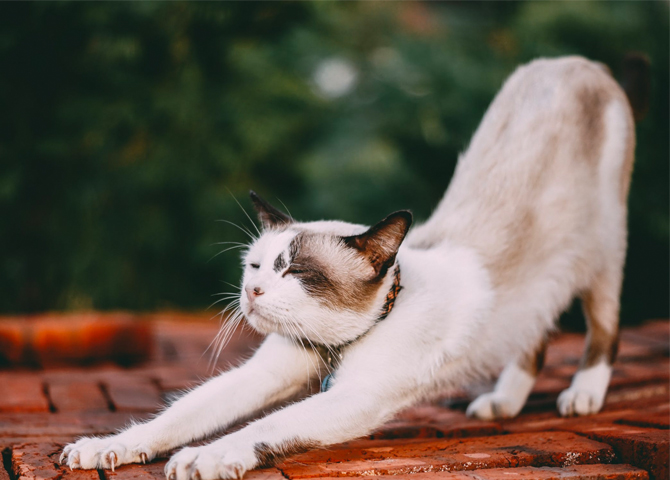5 Wellness habits you should commit to in the morning for a more productive day
Rise and shine

From downing a litre of water to squeezing a workout first thing in the AM, find out if the pros outweigh the cons when it comes to these morning habits.
If your morning routine is a shameless, two-part ritual of 1) trying your hardest to pry your eyelids open as you scroll through Instagram (hoping it’ll wake you up, eh?), and 2) making a mad dash for the bathroom after realising you barely have time to get ready after all that bed-lingering—here’s a suggestion: establish a get-out-of-bed routine first thing in the AM to kickstart a more productive day.
You heard us right—there’s nothing quite rewarding as starting your day on the right foot. Ahead, we debunk some popular wellness habits along with list a few effective ones, from downing a litre of water to sprucing your bedsheets—and why you should commit to them the moment you’re up:
#1: Drink water
View this post on Instagram
The ubiquitous morning habit you may have heard and read from celebrities—downing a litre of water is touted to be the beauty secret to flawless skin, non-groggy mornings, and a good way to kickstart your digestive system. But what’s the real science behind it? Also, do you really need to chug one whole litre of H2O?
According to clinical psychologist and sleep expert Michael J. Breus, consuming about 400–500ml of water right when you wake up can benefit your mind and body more than you think. While we are asleep, our bodies can lose up to a litre of water through our exhalations; so when you wake up, that groggy, not-in-the-right-headspace feeling is likely attributed to dehydration.
The verdict? Have a bottle of water on your side table so that you can easily down it the moment you wake up. (Yes—even before you brush your teeth or check your phone.)
READ: Self-care 101: The skincare routine you need for that post-lockdown glow up
#2: Make your bed

While making your bed isn’t technically a beauty habit, this seemingly menial task has been touted to make a major difference—you may have heard of it from this Navy SEAL’s inspiring graduation speech: “If you make your bed every morning, you will have accomplished the first task of the day,″ said Admiral William H. McRaven. “It will give you a small sense of pride, and it will encourage you to do another task, and another, and another. And by the end of the day that one task completed will have turned into many tasks completed.”
Now if that isn’t good enough of an encouragement for you not to leave your bed in a just-slept-in state, making your bed also reportedly helps with having a well-rested sleep. A recent poll by the National Sleep Foundation found that those who make their bed in the morning were “19 percent more likely to get a good night’s sleep every night.”
It’s pretty simple: Allocate five minutes to your current lingering (in bed) time to fold your blanket/quilt, pat your pillows down and straighten the sheets. First task on your daily checklist: done and dusted!
#3: Juicing before a meal
View this post on Instagram
If you are not intermittent fasting and fancy yourself something healthy for breakfast (but not too hearty), juicing seems like it could be your perfection solution. But is it really?
A go-to of A-listers—from Hannah Bronfman to Jennifer Anniston—swear by downing a glass of fruit/vegetable concoction the first thing in the morning, but the truth is that juicing consistently may be spiking your sugar levels. If you aren’t digging into your fruits and ingesting the fibre that comes with it, you’re straight up allowing the sugar levels to be absorbed quickly into your bloodstream. This will hike up your blood sugar levels, which will eventually dip thus rapidly decreasing your energy levels, aka a blood sugar crash.
That said, you can always incorporate veggie juice into your breakfast or lunch—along with a portion of whole fruits and vegetables to ensure you’re getting sufficient fibre and protein. After all, it’s what allows your body to keep its mass and effectively burn calories.
READ: How to boost your immunity and supercharge your system
#4: Exercise
View this post on Instagram
I know what you’re thinking: Who even has the time (or mental capacity) to work up a sweat, first thing in the morning? But this habit is actually backed up by science—a 2019 study in the Journal of Physiology found that working out in the morning (7am, to be precise) can push your body clock earlier, which will make you feel more alert.
But that’s not all! Low- to moderate-intensity workouts have been proven to relieve stress and improve self esteem, so it’s no surprise that working out in the morning may improve mental health and productivity throughout the day.
Another benefit to getting your heart rate up a notch in the AM: working out on an empty stomach (aka fasted cardio) may burn up to 20 percent more fat than working out in the afternoon or evening, according to a study published in the British Journal of Nutrition. So, it keeps you energetic, burns more calories, and allows you to accomplish more tasks through the day—need we say more?
But if you can’t find the motivation to peel yourself out of bed to hit the gym, start with baby steps. Take on yoga or pilates first, then transition to moderate-intensity physical activity such as brisk walking, jogging or dancing.
READ: 6 Beauty habits we’re committing to this year for better skin
#5: Stretch

Ever wondered why you instinctively stretch like a cat as you wake up? Here’s the real reason why, according to BBC Science: “When you sleep, your muscles lose tone and fluid tends to pool along your back. Stretching helps to massage fluid gently back into the normal position. Also, your muscles protect themselves from over-extension by inhibiting the nerve impulses as they approach their limit. Over time, this safety mechanism becomes increasingly restrictive. Stretching briefly takes your muscles outside their normal range. This recalibrates the feedback mechanisms that determine their normal amount of motion.”
TLDR: This form of stretching is called pandiculating, and it helps to wake your muscles up by loosing and realigning it. Also, stretching can improve your blood circulation and reduce stress at the same time. A couple of stretches you can try while lying in bed include a spinal twist, knee-to-chest stretch and a cobra stretch.
READ: 5 Full-body stretching exercises to practise while you work from home
For more wellness tips, click here.
| SHARE THE STORY | |
| Explore More |



